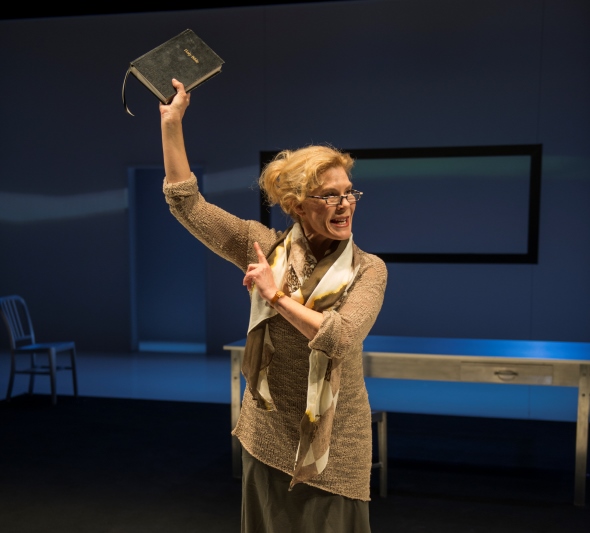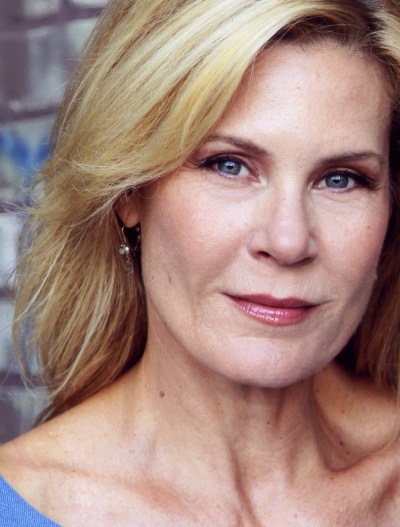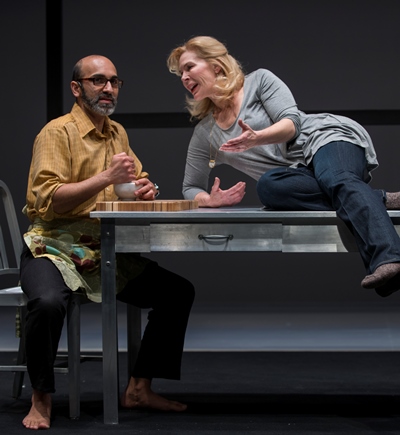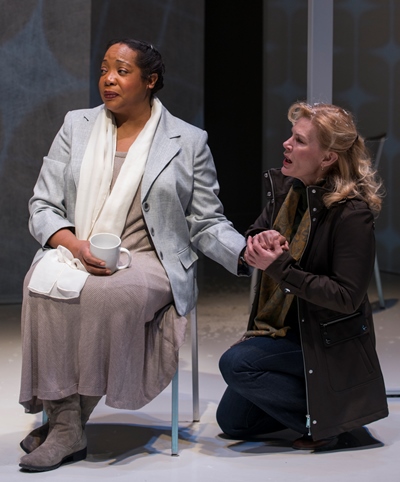Role Playing: Hollis Resnik felt personal bond with zealous, skeptical scholar in ‘Good Book’
 Interview: The star of Court Theatre production says, as a performer, she relates to the intense drive of Bible expert who rejects the book as God’s word. Play runs through April 19.
Interview: The star of Court Theatre production says, as a performer, she relates to the intense drive of Bible expert who rejects the book as God’s word. Play runs through April 19.
By Lawrence B. Johnson
As a veteran actress, Hollis Resnik senses a deep connection with Miriam, the biblical scholar she plays in “The Good Book” at Court Theatre. That commonality, says Resnik, is passion.
“Miriam has a profound intellectual curiosity about the story-telling in the Bible,” she says. “She has a great passion for these stories and what they bring to society, and anyone who has that kind of passion is interesting to me as an actress. But it’s the flavor of the Bible that draws Miriam, not the faith. For her, those stories are a counterpart to the Greek myths. She sees the Bible as a great piece of cultural history.”
 And therein lies the two-fold fascination of “The Good Book,” co-authored by Denis O’Hare and Lisa Peterson. The play is at once an amusing gloss on how the Bible was cobbled into shape over generations and a sort of mid-life crisis story about a venerable scholar who never has bought into the book’s divine provenance. From Miriam’s perspective, the Bible is a document of literary evolution, not a touchstone of faith.
And therein lies the two-fold fascination of “The Good Book,” co-authored by Denis O’Hare and Lisa Peterson. The play is at once an amusing gloss on how the Bible was cobbled into shape over generations and a sort of mid-life crisis story about a venerable scholar who never has bought into the book’s divine provenance. From Miriam’s perspective, the Bible is a document of literary evolution, not a touchstone of faith.
We meet this sharp-minded woman on the first day of class at the college where she teaches. Her extended opening speech is a warning to her students: Leave all your preconceived notions about the Bible at the door. This course is not about belief, it is about good story-telling. And anyway, none of it actually happened. The Red Sea didn’t part for Moses. Adam and Eve? Forget it.
But even as we see her ensuing lectures played out by characters of antiquity, the very human authors of the Bible, Miriam runs afoul of one student in particular who insists that every word of the book must be taken at face value, literally – on faith. And her frustration rises.
“She’s in fear of losing control of her class,” says Resnik. “There’s always been that one student in a hundred with whom she makes real contact, but she feels the new students are not as open minded, not as intellectually curious as students of the past. When the girl challenges her directly, she feels like somebody is taking away her authority, her power.
 “Miriam finds herself backed into a corner. She’s had it up to here with people being closed and she lashes out at this fundamentalist student: ‘I know more than you do.’ It’s an over-reaction. This is a woman with a great mind who is seeking answers and wanting to impart information that is culturally and historically important – a teacher. But she has hit a wall.”
“Miriam finds herself backed into a corner. She’s had it up to here with people being closed and she lashes out at this fundamentalist student: ‘I know more than you do.’ It’s an over-reaction. This is a woman with a great mind who is seeking answers and wanting to impart information that is culturally and historically important – a teacher. But she has hit a wall.”
If Miriam doesn’t quite grasp the toll her frustration is taking, her longtime lover, an archaeologist (played by Kareem Bandealy), does. He tells her she has lost not just her way but her fire as well. She’s about to experience a new loss, and to re-experience an old one: When she is seriously injured, she communes with her mother (Jacqueline Williams), who died when Miriam was a child.
“She has lived a wonderful life and become a great scholar,” says Resnik, “but she saw her mother taken from her as a child and nothing miraculous happened to prevent that. We can shut down memory and forget out of convenience. That’s what Miriam has done, but the hurt has never really gone away.
“When she sees her mother again, in this out-of-body experience, she asks what any child might: ‘Was I a good child? Did you approve of my life choices?’ Miriam’s whole life is in her scholarship. It takes an accident for her to get a time-out, and to reassess the road she has traveled.”
 Miriam’s story, says Resnik, is really (playwright) Lisa Peterson’s story: “She and (co-author) Denis O’Hare are both atheists. What they wanted to show is how the Bible was compiled in an odd sort of haphazard way. Stuff was put in only to be taken out. Certain opinions were included for a while, then removed. It was constantly being transformed.”
Miriam’s story, says Resnik, is really (playwright) Lisa Peterson’s story: “She and (co-author) Denis O’Hare are both atheists. What they wanted to show is how the Bible was compiled in an odd sort of haphazard way. Stuff was put in only to be taken out. Certain opinions were included for a while, then removed. It was constantly being transformed.”
In parallel with Miriam’s personal saga is that of an adolescent boy, Connor (Alex Weisman), a devout Catholic, absorbent reader of the Bible, and gay. And confounded by that last emerging reality.
“Connor is Denis’ autobiography,” says Resnik. “That aspect of the play is filled with people who were in his life. Lisa and Denis wrote this play as an open view of the human journey that needs to be expressed and accepted. It is not about rules and labels.”
Much like its depiction of the Bible’s genesis, she says, the staging of “The Good Book” proved to be a theatrical welter of things put in and taken out, ideas floated and abandoned – a whole lot of making it up as they went along.
“Rehearsing a new play is always difficult,” says Resnik, “but this one involved more weaving in and out (as various characters and time frames intersected) than usual. We had a couple of workshops, but it often felt like a crap shoot where nothing was set in stone. Fortunately, we had a wonderful group of talented, smart, giving artists committed to making it work.
“I’m just proud to be part of it, to tell this kind of story with all its layers of complexity. I’ve never been involved in something with such a strong spiritual point of view. Anyone who sees it will take something from it.”
Related Links:
- Review of ‘The Good Book’: Read it at ChicagoOntheAisle.com
More Role Playing Interviews:
- A.C. Smith is ready undertaker, lord of diner world in ‘Two Trains Running’
- Lia D. Mortensen’s intense portrait of a mentally failing scientist holds mirror to life
- Siobhan Redmond sees re-formed Lady Macbeth as valiant queen in ‘Dunsinane’
- Eileen Niccolai harnessed a storm of emotions to create spark in Williams’ Serafina
- Steve Haggard, aiming at reality, strikes raw core of grieving man in ‘Martyr’
- Shannon Cochran found partners aplenty in sardonic, twice-told ‘Dance of Death’
- Natalie West scaled back comedy to nail laughs, touch hearts in ‘Mud Blue Sky’
- Dave Belden, actor and violinist, adjusted pitch for ‘Charles Ives Take Me Home’
- Joseph Wiens starts at full throttle to convey alienation of ‘Look Back in Anger’
- Shane Kenyon touches charm and hurt of lovable loser in Steep’s ‘If There Is’
- Ramón Camín sees working class values in Arthur Miller’s tragic Eddie Carbone
- Hillary Marren’s charming, rapping witch in ‘Woods’ shapred by hard work, free play
- Mary Beth Fisher embraces both hope, despair of social worker in ‘Luna Gale’
- Brad Armacost switched brothers to do blind, boozy character in ‘The Seafarer’
- Karen Woditsch shapes vowels, flings arms to perfect portrait of Julia Child
- Ora Jones had to find her way into Katherine’s frayed world in ‘Henry VIII’
- Kareem Bandealy tapped roots, hit books for form warlord in ‘Blood and Gifts’
- Eva Barr explored two personas of Alzheimer’s victim to find center of ‘Alice’
- Darrell W. Cox sees theater’s core in closed-off teacher of ‘Burning Boy’
- Chaon Cross turned Court stage into a romper room finding answers in ‘Proof’
- Dion Johnstone turned outsider Antony to bloody purpose in ‘Julius Caesar’
- Noir films gave Justine Turner model for shadowy dame in ‘Dreadful Night’
- Anish Jethmalani plumbs agony of good man battling demons in ‘Bengal Tiger’
- Gary Perez channels his Harlem youth as quiet, unflinching Julio in ‘The Hat’
- Kamal Angelo Bolden sharpened dramatic combinations to play ‘The Opponent’
- In wheelchair, Jacqueline Grandt explores paralysis of neglect in ‘Broken Glass’
- James Ridge thrives in cold skin of Shakespeare’s smiling serpent, Richard III
- Stephen Ouimette brews an Irish tippler with a glassful of illusions in ‘Iceman’
- Ian Barford revels in the wiliness of an ambivalent rebel in Doctorow’s ‘March’
- Chuck Spencer flashes a badge of moral courage in Arthur Miller’s ‘The Price’
- Rebecca Finnegan finds lyrical heart of a lonely woman in ‘A Catered Affair’
- Bill Norris pulled the seedy bum in ‘The Caretaker” from a place within himself
- Diane D’Aquila creates a twice regal portrait as lover and monarch in ‘Elizabeth Rex’
- Dean Evans, in clown costume, enters the darkness of ‘Burning Bluebeard’
- Dan Waller wields a personal brush as uneasy genius of ‘Pitmen Painters’
- City boy Michael Stegall ropes wild cowboy in Raven Theatre’s ‘Bus Stop‘
- Brent Barrett is glad he joined ‘Follies’ as that womanizing, empty cad Ben
- Sadieh Rifai zips among seven characters in one-woman “Amish Project”
- Kirsten Fitzgerald inhabits sorrow, surfs the laughs in ‘Clybourne Park’
- Janet Ulrich Brooks portrays a Russian arms negotiator in ‘A Walk in the Woods’
Tags: Alex Weisman, Court Theatre, Denis O'Hare, Hollis Resnik, Kareem Bandealy, Lisa Peterson, The Good Book


No Comment »
4 Pingbacks »
[…] Hollis Resnik felt personal bond with zealous, skeptical scholar in ‘Good Book’ […]
[…] Hollis Resnik felt personal bond with zealous, skeptical scholar in ‘Good Book’ […]
[…] Hollis Resnik felt personal bond with zealous, skeptical scholar in ‘Good Book’ […]
[…] Hollis Resnik felt personal bond with zealous, skeptical scholar in ‘Good Book’ […]